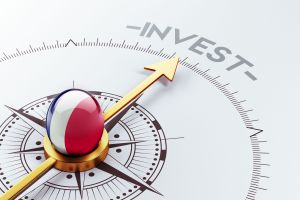OP-ED: MENGAPA DUNIA HARUS TINDAK CHINA DAN BERINVESTASI DI MASA DEPAN AFRIKA'S
Hendrik du Toit, co-CEO dari Investec Grup berpendapat perekonomian Afrika telah ulet dan cerita pertumbuhan jangka panjang benua - Pertumbuhan terutama hijau - tetap menarik untuk berinvestasi di Afrika.
By Hendrik du Toit is co-CEO of Investec Group
I remember a time, lebih 20 tahun yang lalu sekarang, ketika modal hampir tidak ada profesional yang dikelola bergerak melintasi perbatasan di Afrika. When aid and corruption drove the investment narrative. When Africa was called the “benua putus asa”. When sustainability wasn’t even part of an investor’s vocabulary. We’ve come a long way.
The millennium heralded rapid growth across the African continent. At around 3%, tingkat default pada infrastruktur Afrika adalah beberapa yang terendah di dunia. Africa has the fastest growing population and is seeing a wave of innovation and entrepreneurship sweeping across the continent. The latter is strongly enabled by mobile phone technology which has directly facilitated a financing revolution. Off-grid instalasi panel surya telah menjamur, dibeli melalui pembayaran bulanan dibuat pada ponsel, through companies like Mobisol and M-Kopa.
Tentu saja, peristiwa global dan domestik, termasuk 2014 harga minyak kejutan hit negara besar terutama sulit; kita telah melihat penurunan baru-baru dalam kinerja di Angola, Nigeria, and my home country of South Africa. But overall, African economies have been resilient and the continent’s long-term growth story – particularly green growth – remains compelling.
Miliaran dolar telah diinvestasikan dalam energi terbarukan di seluruh benua. Akhir tahun lalu, Nigeria mengeluarkan N10.69 miliar (US $ 29 juta) bond hijau to fund local solar and forestry projects. This is Africa’s first sovereign green bond – one of only a handful in the world (bersama Cina, Perancis, Polandia, Fiji dan Indonesia). Kenya will soon follow.
Itu Bank Dunia also estimates that aggregate growth in Sub-Saharan Africa for 2018 akan sekitar 3.2%, naik dari 2.4% tahun lalu. The continent is expected to host six of the 10-fastest growing economies of the world in 2018, sementara aset tradisional di bawah manajemen (termasuk pensiun dan reksadana) are forecast to grow to around US$1.1 trillion by 2020, up from US$634billion in 2014.
Pendeknya, Afrika sangat banyak “terbuka untuk bisnis”, particularly for investors who are chasing yield and diversification. China’s got the message, committing to US$60 billion in new investment in major capital projects across Africa. Indeed, Cina telah menjadi bagian integral dari peremajaan Afrika dengan menjadi tujuan ekspor terbesar Afrika, Sumber terbesarnya impor dan baru-baru modal sumber terbesarnya, ekuitas dan utang.
Ini adalah sinyal positif, but a lot more capital is still needed, terutama dari investor institusi besar. Estimates put the Defisit infrastruktur Afrika sekitar US $ 90 miliar every year for the next decade. Across the continent, 620 juta orang masih tidak memiliki listrik; 319 juta orang hidup tanpa akses ke air minum yang handal; dan hanya 34% memiliki akses jalan.
Ada beberapa hal yang dapat membantu. pertama, “Pencampuran” modal publik dan swasta dapat meningkatkan profil aset ini risk-return, so vehicles which use development money to mitigate investor risks can attract much needed commercial investment. Some of these vehicles – like The Pertukaran Mata Uang, which offers FX hedging in emerging markets – have successfully mobilised billions of dollars of private money for African projects.
Another example is the Infrastruktur Fund Berkembang Afrika (EAIF) with projects ranging from water supply in Rwanda to solar power in Uganda. The EAIF is part of the Private Infrastructure Development Group (dengan ekuitas dari pemerintah termasuk Inggris, Swedia, Jerman dan Belanda) and recently announced that it had menarik pemberi pinjaman komersial pertama di perusahaan asuransi global yang Allianz, as part of a $385 million fund-raising round. This investment signals a shift in appetite for African risk from institutional investors. These vehicles need to be scaled and replicated.
Kedua, to attract investment for high-impact assets like climate-resilient, sustainable infrastructure, development banks need to be more effective at crowding di private capital using instruments like political risk insurance and guarantees, not crowding them di luar. Sebagus-bagusnya, itu bank pembangunan multilateral (MDB) memobilisasi kurang dari $1 dari modal swasta untuk setiap dolar publik di seluruh portofolio mereka. They should target much higher mobilisation ratios and sharply increase their share of private sector activities (yang saat ini hanya mencapai sekitar 30% kegiatan MDB).
Ketiga, frontier countries must compete for investor dollars by making it easier for the private sector to do business. This requires strong, kepemimpinan politik, depth in local capital markets, the right legal framework and transparent policies. In particular, local policies should support regional simplicity to facilitate cross-border operations that can generate scale. Sebagai contoh, a very important, but much-overlooked regulatory amendment recently saw the amount that dana pensiun Afrika Selatan bisa berinvestasi ke dalam sisa Afrika meningkat dari 5% untuk 10%. It’s only when public markets are deep enough for strong exits that we’ll see bigger and bigger deals happening.
Yang paling penting, if we really want to see sustainable growth and the associated economic and financial returns, komunitas investasi perlu untuk memimpin. We need to take a leaf out of China’s book, merangkul infrastruktur Afrika sebagai peluang investasi, mengambil keuntungan dari alat mitigasi risiko dan mengatasi kesenjangan besar dalam persepsi risiko antara pasar negara berkembang dan dikembangkan. Kita juga bisa menggunakan kekuatan investasi kami untuk mendorong nilai bagi pemegang saham sementara memprioritaskan “hijau”, pembangunan berkelanjutan (mis. through initiatives like Aksi Iklim 100+).
This is all part of how we move away from an “aid-based” narrative to one of business and investment. It is also how we can provide the platform for economic inclusion of the world’s most youthful and fastest growing labour force. I dream of a future shaped by bold and wise investment decisions.
SUMBER: Afrika CNBC

